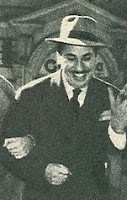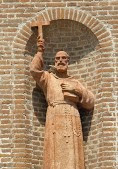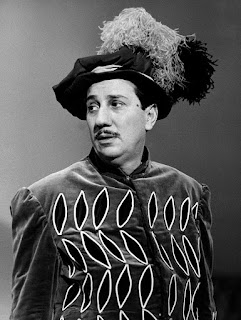Giuseppe Di Stefano – tenor
Singer from Sicily who made sweet music with Callas
The opera singer Giuseppe Di Stefano, whose beautiful voice led people to refer to him as ‘the true successor to Beniamino Gigli’, was born on this day in 1921 in Motta Sant’Anastasia, a town near Catania in Sicily. Di Stefano also became known for his many performances and recordings with the soprano, Maria Callas, with whom he had a brief romance. The only son of a carabinieri officer, who later became a cobbler, and his dressmaker wife, Di Stefano was educated at a Jesuit seminary and for a short while contemplated becoming a priest. But after serving in the Italian army he took singing lessons from the Swiss tenor, Hugues Cuenod. Di Stefano made his operatic debut in Reggio Emilia in 1946 when he was in his mid-20s, singing the role of Des Grieux in Massenet’s Manon. The following year he made his debut at La Scala in Milan in the same role. Di Stefano made his debut at the Metropolitan Opera in New York in 1948 as the Duke of Mantua in Verdi’s Rigoletto. Read more…
___________________________________________________________________
Eugene de Blaas - painter
Austro-Italian famous for Venetian beauties
Eugene de Blaas, a painter whose animated depictions of day-to-day life among ordinary Venetians were his most popular works, was born on this day in 1843 in Albano Laziale, just outside Rome. Sometimes known as Eugenio Blaas, or Eugene von Blaas, he was of Austrian parentage. His father, Karl, also a painter, was a teacher at the Accademia di Belle Arti (Academy of Fine Arts) in Rome. His brother, Julius, likewise born in Albano, was also a painter. In 1856, the family moved to Venice after his father was offered a similar position at the Venetian Academy. At that time, Venice attracted artists from all over Europe and the young De Blaas grew up in a social circle that was largely populated by painters and poets. Like his father, he became interested in the school known as Academic Classicism, a style which seeks to adhere to the principles of Romanticism and Neoclassicism. He exhibited at the Venice Academy when he was only 17 years old. Read more…
_________________________________________________________________
Victor Emmanuel of Sardinia
The first king to be called Victor Emmanuel
The King of Sardinia between 1802 and 1821, Victor Emmanuel I was born on this day in 1759 in the Royal Palace in Turin. He was the second son of King Victor Amadeus III of Sardinia and was known from birth as the Duke of Aosta. When the King died in 1796, Victor Emmanuel’s older brother succeeded as King Charles Emmanuel IV of Sardinia. Within two years the royal family was forced to leave Turin because their territory in the north was occupied by French troops. After his wife died, Charles Emmanuel abdicated the throne in favour of his brother, Victor Emmanuel, because he had no heir. The Duke of Aosta became Victor Emmanuel I of Sardinia in June 1802 and ruled from Cagliari for the next 12 years until he was able to return to Turin. During his reign he formed the Carabinieri, which is still one of the primary forces of law and order in Italy. Read more…
Home













